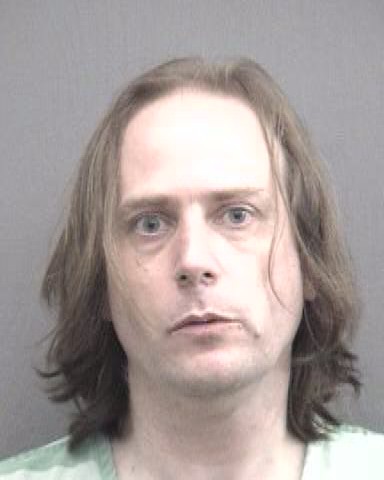9/10/10 CORRECTION: In a correction previously placed here and published in the Sept. 9, 2010 edition of Alachua County Today, Charles Grapski's sentence was again incorrectly reported. In an amended order, Judge James P. Nilon "clarified" his sentencing of Grapski to make it clear that the one-time University of Florida doctoral student would not only serve a total of 240 days in jail with credit for time served, but also serve two years of community control/house arrest followed by eight years of probation.
Political activist and one-time University of Florida student Charles Grapski is back in jail after being found guilty Wednesday of violating probationary terms stemming from a 2007 arrest in Alachua.
On Feb. 2, the one-time City of Alachua
The Wednesday afternoon hearing included testimony from two probation officers who worked with Grapski, one of whom was his primary officer.
The big sentence
Judge James Nilon found Grapski guilty of violating his probationary terms and initially sentenced him to five years in prison to run consecutively for each of the two felony convictions of battery on Alachua police officers he received last year. To run concurrently with that 10 years, Grapski was nailed with two years for resisting an officer with violence, a misdemeanor, when he refused to be strip searched after being booked into jail on the charges of that 2007 incident.
But Judge Nilon withheld those penalties and instead imposed a total of two years of community control/house arrest followed by eight years of probation. He also sentenced Grapski to 240 days in jail; that’s more than the 150 days he had been sentenced to during the Dec. 29, 2009 hearing. Having been credited with 126 days of time served leading up to and following last year’s trial, Grapski will now be in the slammer for another 114 days. Judge Nilon ordered that all previous terms and conditions of Grapski's probation remain in effect.
Perhaps most damaging to Grapski’s future is that Judge Nilon rescinded his agreement to withhold an adjudication of guilt on the felonies. Although the jury had found Grapski guilty of those charges, Nilon agreed to withhold that adjudication at sentencing pending his successful completion of the probation and community service. The judge’s decision on Wednesday evening means Grapski will now be marked as a felon.
The one-time commission candidate did not take the news well. Grapski began shouting at the judge and accusing him of making a mockery of the process. In a courtroom with five bailiffs, Grapski’s temperament appeared to be reaching a fever pitch before two bailiffs dragged him from the room into a holding cell.
As Judge Nilon continued reading the sentence, Grapski could be heard in the background making noise from the holding area. Alluding to the ongoing outbursts, Nilon said Grapski’s actions Wednesday confirmed his thoughts that Grapski respected neither the law nor the court.
Once a doctoral student at the University of Florida, Grapski finds himself tonight in a cell at the Alachua County jail where he was booked for the charges.
The science of marijuana testing
Grapski took the stand himself during Wednesday’s hearing, speaking about his health, diet and stress levels leading up to and after his November 2009 trial and his Dec. 29, 2009 sentencing. He admitted using marijuana repeatedly in the weeks and months before his five-day trial in November. The political activist also said he had a significant weight drop, about 40 pounds, between the time of his sentencing and that of his drug test. That is in addition to reportedly eating little other than salads on which he used hemp seed oil as a dressing.
When asked by Assistant State Attorney Geoffrey Fleck when he last used marijuana, Grapski testified the latest would have been before his trial began in November 2009.
Grapski’s court-appointed public defender, Holly Stacy, called to the stand toxicologist Lawrence W. Masten, Ph.D. Masten presented a 1985 study conducted by the U.S. Navy in which subjects in a rehabilitation center were monitored and tested for levels of THC.
In the study, people who were light users of marijuana had the presence of THC acids in their systems for as short as seven days and as long as 34. Moderate users could take as long as 70 days before the presence of THC acids were less than levels that the test would register as positive. Meanwhile, subjects identified as heavy users of marijuana were found to require as long as 81 days before consistently testing negative for the presence of THC acids, according to the study presented by Masten.
Stacy noted that Grapski had been sentenced on Dec. 29, 2009 and had tested positive in a sample taken on Feb. 2, 2010, just 34 days after sentencing. That seemingly gave the impression that it was possible Grapski could have tested positive for THC acids, especially in light of his reported consumption in the interim of hemp seed oil, which can apparently contain trace amounts of the chemical.
When asked by Fleck how hemp seed oil could impact a marijuana test, Masten said significant consumption of the oil might push someone from having a THC level below the positive reading level to just over that. But Fleck also noted that Grapski was considerably above the minimum threshold for testing positive, not at a level reached by consuming trace amounts of hemp seed oil. Grapski’s tests showed 30 nanograms per milliliter, twice that of the 15 nanograms set as a threshold by the laboratory.
In his summarizing comments Wednesday, Fleck pointed to Grapski’s own testimony in which he said he hadn’t used marijuana since before his trial began. Jury selection of Grapski’s trial began on Nov. 9 and concluded on Nov. 13. That means that Grapski would not have consumed marijuana for at least 85-days before the Feb. 2, 2010 test, several days longer than even a heavy user required before no longer testing positive, according to Grapski’s own expert witness.


